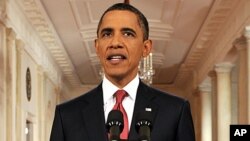U.S. lawmakers on Tuesday will discuss a pair of competing plans to raise the nation's debt limit, with the deadline to avoid a possible first-ever debt default now just one week away.
President Barack Obama said Monday night in a televised address that Congress risks sparking a "deep economic crisis" if lawmakers fail to reach a compromise on the debt ceiling by August 2.
Hours before Obama's speech, the Democratic-controlled Senate and Republican-controlled House of Representatives unveiled rival plans, both of which would cut government spending and raise the nation's borrowing limit.
In his speech, President Obama backed the plan proposed by Senate Democratic leader Harry Reid, whose plan plan calls for $2.7 trillion in cuts and would raise the debt ceiling through next year's general election in November.
In his own televised response, Republican House Speaker John Boehner dismissed the Senate measure, saying it is filled with "phony accounting" and "Washington gimmicks." Instead, Boehner proposes $1.2 trillion in spending cuts, an immediate $1 trillion debt cap increase, and another possible increase next year tied to additional spending cuts and tax reforms.
Meanwhile, President Obama said the Boehner plan was only a short-term solution that "doesn't solve the problem." He criticized conservative Republicans for wanting to solve the debt crisis with just spending cuts without asking corporations and the wealthiest Americans to contribute through changes in the tax code.
If there is no plan to let the federal government keep borrowing funds by August 2, the country risks defaulting on its debt. The Treasury could not pay its investors, and interest rates would rise for anyone seeking loans from U.S. banks. The government also would not be able to meet such obligations as Social Security checks to retirees and to fulfill corporate contracts.
US Lawmakers to Discuss Competing Debt Limit Plans




